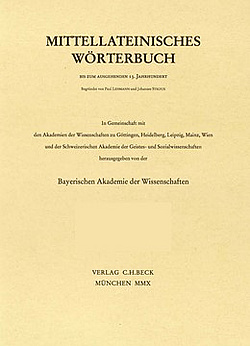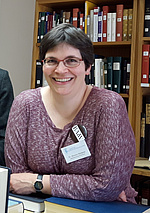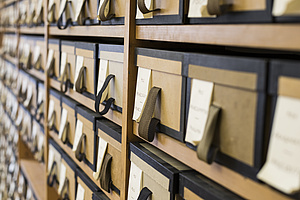
R. I. P. Dr. Monica Niederer (1969-2026)
Die Mitarbeiterinnen und Mitarbeiter des MLW trauern um ihre langjährige Kollegin Dr. Monica Niederer.
Sie hat jahrzehntelang hochengagiert am Wörterbuch mitgearbeitet und neben der eigentlichen Artikelarbeit vor allem die Lemmalisten erstellt und immer wieder Workshops zur lexikographischen Arbeit geleitet. Außerdem hat sie sich um neu ankommende Stipendiat(inn)en oder Kolleg(inn)en gekümmert, indem sie sie mit ihrer gewinnenden, offenherzigen Art schnell und effektiv in die Arbeit einführte.
Am Samstag, dem 31. Januar 2026, ist Monica Niederer nach schwerer Krankheit verstorben.
Mit ihr verliert das Kollegium des MLW eine äußerst kompetente und diskussionsfreudige Mitarbeiterin. Sie hinterlässt eine schmerzliche Lücke in einer für das Wörterbuch signifikanten Zeit des Um- und Aufbruchs, die nur schwer zu füllen sein wird.
Research and Documentation of the Latin Language of the Middle Ages
The Dictionary of Medieval Latin (Mittellateinisches Wörterbuch, MLW) addresses Latin texts that were created between 500 AD and 1280 AD in the German-speaking area, existing in edited versions.

The Mittellateinische Wörterbuch is the largest of 20 national dictionaries on medieval Latinity, compiled in Europe under the aegis of the Union Académique Internationale (UAI) (see also Medieval Latin Dictionary Projects).
The dictionary represents a basic research project, established already in 1939 with the Bavarian Academy of Sciences and Humanities (Bayerische Akademie der Wissenschaften (BAdW)). Today, the project is headed by a committee, until 2015 named «Kommission für die Herausgabe eines mittellateinischen Wörterbuches»; an advisory board supports and advises the committee with the project’s implementation. Currently, a scientific staff of eleven associates is developing the dictionary articles. They are supported by a part-time secretary as well as by the former head of department, who is supporting the project essentially pro bono during his retirement.
The Material Assembly
Starting in 1948, the foundation for work on the MLW has been layed: 50 main texts were replicated on slips, about another 2500 were excerpted and indices of text editions were combed. Today, all this amounts to about two million occurences from altogether almost 4000 texts, being available as a base for researching the word meanings.
The dictionary slips are pre-arranged alphabetically, according to authors names and work titles and stored in an archive containing about 1,5 million slips. The library area provides about 10,000 volumes of specialist literature for the associates.
The Publication
In 1959, the first MLW fascicle was published following some preparatory work. Today the publication cycle aims at one or two fascicles each year (published by C. H. Beck, Munich).
As of today (2019), there are three completed volumes available (A–B, C, D–E).
Of volume IV (F–K), already 14 parts (F, G, H, I–intrepidus) are published, which amounts to altogether 49 fascicles or about two thirds of the complete works (see also Publications).
Since August 2020 there ist the additional offer to consult our publications from A-H as PDF files. This service (via MLW Open Access) is free of charge.
MLW digital
In cooperation with the Trier Center for Digital Humanities an online-version of the MLW was developed. Beyond the print issues, the MLW online version is available to the interested since July 2019.
In the first instance, the digitally not available first two volumes (A–B und C) were retro-digitized. The other volumes will gradually follow.
The MLW online-version includes various search templates, the perspective preface for the published volumes as well as a digital references index and a reference list. Under MLW digital, further information and a link for online access is added for you.
Public Relations
MLW associates attend national and international conventions, they organise their own workshops and conferences, presenting the dictionary’s work. They also advise interested persons in all questions regarding Medieval Latin.
You have any questions? You are welcome to visit us at our Munich department or contact us via e-mail or letters or by using the contact form on this website (see Contact). We kindly ask you to adhere to some basic rules (see also FAQ).
Funding
The Mittellateinische Wörterbuch is funded equally by the Union of the German Academies of Sciences and Humanities and the Free State of Bavaria. Currently, the Austrian Academy of Sciences is dispatching and funding one employee, the Swiss Academy of Humanities and Social Sciences is regularly financing scholarships to support the project.


